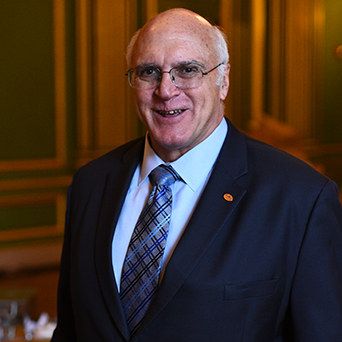"Engineers are going to be in high demand in the future. Job categories are going to be specialized, requiring a high degree of training and education."
— Tommy Gardner, chief technology officer for HP Federal

Technology expert Tommy Gardner will talk about the importance of cybersecurity, quantum information systems, 3-D printing and manufacturing, and software programming during his presentation at 3 p.m. Tuesday, Feb. 19, in Research Hall, room 163. He's the featured speaker for Engineers Week.
As the featured speaker for Engineers Week at Mason, Tommy Gardner, chief technology officer for HP Federal, will discuss the impact of the digital and computing worlds on engineering in his presentation at 3 p.m. Tuesday, February 19, in Research Hall, room 163.
Gardner provides technology leadership and supports the sales and service of computers, printers, and 3-D printers to the federal government. He has expertise in cybersecurity, data science, blockchain technologies, artificial intelligence, high-performance computing, and systems integration in government markets.
He earned a bachelor of science in mechanical engineering from the U.S. Naval Academy, a master’s in public administration from Harvard, a master of science in management of technology from the Massachusetts Institute of Technology, and a PhD in energy economics from George Washington University.
He serves as chair of the American Society of Mechanical Engineers (ASME) industry advisory board and is on the advisory board for Mason’s Department of Mechanical Engineering.
What is the focus of your speech?
The main focus of the talk is the digital engineer—the application of the computer world into the engineering profession. I will talk about the importance of cybersecurity, quantum information systems, 3-D printing and manufacturing, and software programming.
The digital engineer incorporates the tools and techniques of their digital environment to better design, build, and maintain the products in their company. Almost every product has embedded chips and software designed within. The digital engineer must know how to use this technology to their advantage.
Our new tools and new techniques in the digital world have been aided and abetted by computing power, storage capability of data, and the speed of the process. The engineering field is changing much faster than it ever has in the past.
What is the future of engineering?
Positive. At HP, we are looking at megatrends—where things are going in technology, society, and economy.
Engineers are going to be in high demand in the future. Job categories are going to be specialized, requiring a high degree of training and education.
A lot of jobs that exist now won’t exist in the future, and a lot of new jobs will be created to support the new technologies that are coming out today.
For instance, there will be more jobs in maintaining and operating artificial intelligence systems and 3-D printers, as well as controlling machines and robots. Welding will be done by robots. Surgeons will be operating computers to do the surgery. Even the doctors who read X-rays and mammograms today will be replaced by machines.
There are going to be hundreds of other examples.
What’s your advice for undergraduate engineering students?
They should take two years of a software programming language—R, Python, C++, Java or other similar programs. They should have some understanding of a digital language. You need to embrace the digital world in whatever specific area of engineering is your passion.
Your advice for graduate students?
The graduate student is trying to push the boundaries in being in-depth in their specific area of engineering.
This is a time to explore a systems engineering approach. Many engineering jobs in the future are going to be systems engineering jobs. The mechanical engineer is going to have to bring in the electrical engineer, the chemical engineer, and the civil engineer to understand, design, or maintain the whole system.
Your advice to all engineering graduates?
Plan for lifelong learning. You need to continue to pick up knowledge and information from classroom and online courses to qualify for better jobs in the future. The job you get right out of college may not even exist in 20 years, so you have to stay on top of changes in your profession.
Any other suggestions?
George Mason is a great school. Students should be very proud of the Volgenau School of Engineering. Don’t forget Mason when they get out in the workplace and industry. Come back and support the programs as best as you are able.
